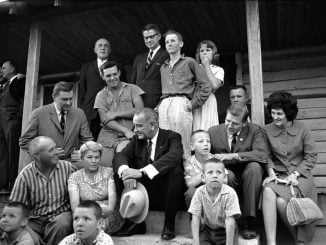
In an age of increasing emphasis on science and technology, many ask the question: “Why study history?” It’s as if the discipline should be relegated to the “dustbin of history,” even when political pundits, for instance, make utterances about being on “the right side of history.”
One cannot escape history. Even much of science fiction is written in the past tense. No matter one’s profession, history, at some level, is important. It may be the only thing we know.
When I teach a U.S. history course, the first class includes an introductory lecture asking two seemingly easy yet truly difficult questions: 1) What is history? 2) What is the United States? This column will explore the first question. My next will answer the second.
For some reason, many think history is mere memorization of facts. It is more than trivia for a pedantic forum, however. The historian makes something of the facts and offers an interpretation. Historians help readers understand themselves and their situations. Otherwise, chronicling only takes up physical or online space.
Although history can incorporate the scientific method, scientific determinism should be avoided. Such approaches offer an incomplete or an inaccurate narrative. Although humans have similar emotions and desires, scientific determinism (of whatever sort) can lead the historian to forget about human qualities. We should study real people, not categories of people. Life isn’t simple, and many times, history has multiple causes.
History is not mere opinion. As humorist Josh Billings, or Mark Twain, or was it Will Rogers once quipped (the point remains): “It isn’t what we don’t know that gives us problems, it’s what we know that ain’t so.” Historians must do research and provide evidence for interpretations.
History is important because it helps develop a “historical consciousness.” While helping form a personal and patriotic identity, history can force us to consider the experiences of others. In short, history can help us understand people and societies and the effect of change in both.
History can help us avoid problems. Although future certainty of rightness is unknown, the prolific G.K. Chesterton penned, “We can be almost certain of being wrong about the future, if we are wrong about the past.”
At this point, the reader may be exclaiming, “I know what history is not! I know it is important! But, what is it?”
History may be the only thing we truly know; the present is simply a splash between the past and the future. Historian John Lukacs puts forth the following “good description:” “History is the memory of Mankind.”
History, Lukacs argues, is the recorded past, the remembered past, and what is not recorded or remembered. It is always growing and will be larger by the time you finish reading this commentary.
A person’s history, or life, includes records, memories, and unremembered actions. For example, some personal history is recorded in legal documents, diaries, and correspondence. A lot of your history is remembered (you have childhood memories, and people remember your actions). And much of one’s life may not be recorded or remembered. Yet, it remains part of a broader history.
As history becomes larger and larger with each day, memory becomes more important. Documents, for example, tell us facts, yet they trigger memories that make for a more complete history. Imagine forgetting every experience, Lukacs ponders.
This can be applied on an aggregate level, too. Imagine a nation forgetting its past. Could it learn from its mistakes? Would it build upon and continue its best practices?
History has many levels. Your correspondence, for instance, can be as important to the “memory of Mankind” as a gubernatorial or presidential letter. The larger narrative needs them all. By reading an ordinary person’s correspondence, for instance, one can, understand a little regarding, among many things, the concerns and themes of an era.
Please don’t mistake this commentary as a product of nihilism or relativism. It is far from it. There is indeed truth, and history can help one find it. History, though, can be a humbling enterprise.
Simply put, everyone has a history, and as Lukacs writes, all are “components of history of their times.” We are all human beings, and history is the marshaling of evidence to support the memory of other human beings. By doing so, we can learn many lessons.
Troy L. Kickler holds a doctorate in history and has taught at N.C. State. One of his current projects is a study of Andrew Jackson’s leadership style.



